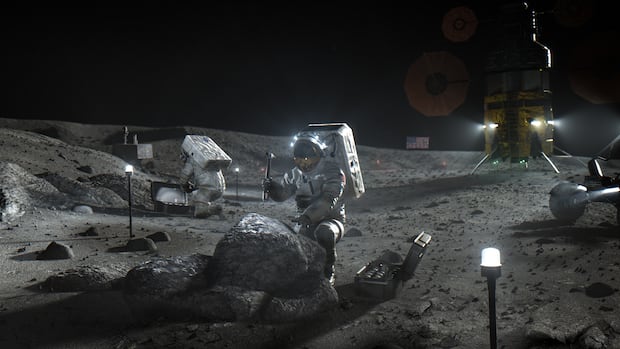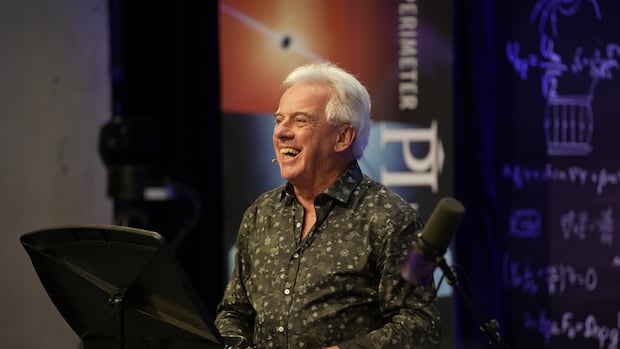Family, friends, investigators and explorers say they’re appalled and heartbroken, and are calling for accountability and justice after the United States Coast Guard released its final report on the implosion of the Titan submersible on Tuesday.
The coast guard’s Marine Board of Investigation report landed two years after OceanGate’s Titan imploded while diving to the site of the Titanic wreck, killing all five people on board.
The 335-page document outlines many problems with the company’s operation, the integrity of the vessel and what led to the fatal incident in 2023.
Hamish Harding, father and son Shahzada and Suleman Dawood, Paul-Henri Nargeolet and OceanGate CEO Stockton Rush were the crew members.
The company suspended operations in July 2023.
OceanGate spokesperson Christian Hammond told the Associated Press the company has been winding down, and was co-operating with the investigation.
‘Not shocked’
Harding was the chairman of Action Aviation. The company expressed its outrage over what the report revealed.
“We are obviously appalled by the contents of the investigation report, but not shocked,” Mark Butler, CEO of Action Aviation, said in a statement to CBC News.
“It was very evident from the early stages of the investigation, now confirmed by the published report, that Mr. Rush had been trying to run his company on a shoestring, cutting corners, and paying little attention to basic safety and best practices.”
Butler took over for Harding after his death.
He called Rush and his company’s actions “selfish and senseless.”
Butler said Harding’s family have no plans to comment at this time.
Two years after the fatal Titan submersible implosion, the United States Coast Guard Marine Board of Investigation has released its report on the disaster. As the CBC’s Mark Quinn reports, it says the five deaths were completely preventable.
The family of Shahzada and Suleman Dawood also weighed in on the report’s findings.
In a statement to CBC News, the family said the report confirms that “unregulated behaviour, a lack of accountability and a fundamentally flawed design” caused the tragedy.
But, it won’t bring back what they’ve lost.
“No report can alter the heartbreaking outcome, nor fill the immeasurable void left by two cherished members of our family,” the statement reads.
The Dawood family also called for regulatory reform within the submersible industry.
“We believe that accountability and regulatory change must follow such a catastrophic failure. We hope this tragedy serves as a turning point and one that drives meaningful reform, rigorous safety standards, and effective oversight within the submersible industry,” the statement reads.
“If Shahzada and Suleman’s legacy can be a catalyst for regulatory change that helps prevent such a loss from ever happening again, it will bring us some measure of peace.”

The Shaheed Suleman Dawood Mosque now stands in St. John’s, made possible by a donation from Hussain Dawood, father and grandfather of the deceased.
Suleman Dawood was the Titan’s youngest passenger. He was 19 years old.
‘There were really no checks and balances’
The family of renowned French explorer Paul-Henri Nargeolet also expressed their desire for justice — beyond the report’s findings.
“We also believe there are more entities legally responsible that weren’t focused upon given how egregious OceanGate’s conduct was,” said Tony Buzzbee, the attorney representing Paul-Henri Nargeolet’s estate, in a statement to CBC News.
“We look forward now to continuing our efforts in court to obtain justice for the family.”
Jason Neubauer, chair of the Marine Board of Investigation for Titan implosion, said OceanGate’s workplace culture and failure to prioritize safety were key factors in the tragedy.
“OceanGate’s culture was one of the worst, from a safety perspective, and it stems from a lot of different reasons,” Neubauer said in an interview with CBC News. “But the primary was that you had the head of the company, the CEO, serving in so many different roles.”
In the MBI report, Rush’s relationship to the vessel is stated as chief pilot, chief executive officer and secretary of OceanGate’s board of directors.
“He was a consolidation of power into one individual, and there were really no checks and balances,” said Neubauer.
If the CEO were still alive, Neubauer said MBI would recommend that a separate criminal investigation be opened for manslaughter.
“There was negligence involved there, not only from not complying with any of the regulatory standards and certifications and testing, but also for a failure to maintain the vessel with any standard of care,” he said.
“There’s negligence that would absolutely constitute a referral to the Department of Justice for a separate investigation.”
Neubauer said the company failed to follow through with safety systems put in place, disregarding safety data, even though “warnings were there” from the 2022 operating season.
He also noted his surprise at the level of cost-cutting that occurred in OceanGate’s operations.
“They downgraded the size of the support vessel so that the Titan had to be towed thousands of miles,” said Neubauer.

The submersible was also stored outside over the winter in St. John’s.
“That should have never occurred for a carbon fibre craft that is susceptible to porosity and moisture. Those things stand out,” said Neubauer.
The future of submersible exploration
Larry Daley, Titanic expedition specialist, visited the Titanic wreck in a submersible himself in 2003, and considered Nargeolet a close friend.
To him, the report revealed that the tragedy was one that could have been avoided.
“I knew in my heart and soul this was going to end poorly,” Daley told CBC News.
Daley said expeditions to the Titanic should continue, but safety should be a priority.
“Exploration is good. It’ll keep going on for years. But you got to separate the fame from the fortune,” Daley said. “It all comes down to doing it safely and having the right equipment.”
Neubauer said the Titan, in his view, is a good case for regulatory change at an international level. Involving multiple nations and occurring on the high seas, he says it’s one the International Maritime Organization could look at.
“In regard to submersible standards right now, they’re recommendatory. We’re going to recommend that they be mandatory just in case you have a situation like this,” he said.
Download our free CBC News app to sign up for push alerts for CBC Newfoundland and Labrador. Sign up for our daily headlines newsletter here. Click here to visit our landing page.







